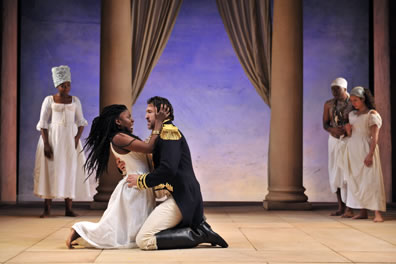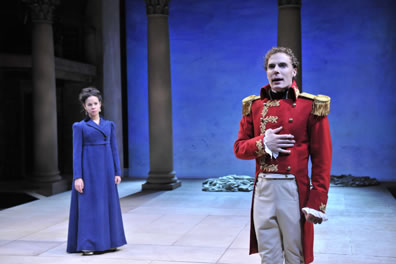Antony and Cleopatra
Sinking in a Caribbean Love Triangle
Royal Shakespeare Company, The Anspacher at The Public Theater, New York, N.Y.
Saturday, March 1, 2014, B-4&6, right of thrust stage
Directed by Tarell Alvin McCraney

Love Egyptian style, Cleopatra (Joaquina Kalukango) and Antony (Jonathan Cake) clasp as, from left, Charmian (Sarah Niles), Soothsayer (Chivas Michael) and Iras (Charise Castro Smith) watch in the Royal Shakespeare Company touring production of Antony and Cleopatra. Photo by Hugo Glendinning, Royal Shakespeare Company.
The frustration is piling up. When Octavius Caesar sends one of his messengers to woo Cleopatra suggesting she earn his mercy by turning Marc Antony over to him, Antony has the messenger whipped and sent back to his rival with this message: "Look thou say he makes me angry with him. For he seems proud and disdainful, harping on what I am, not what he knew I was." Jonathan Cake playing Antony in the Royal Shakespeare Company's touring Caribbean-set production of William Shakespeare's Antony and Cleopatra, currently residing at The Public in New York, unleashes a vocal volley of indignation with this speech. And yet, even in Cake's delivery, the line has a strong undertow of irony, for "what I am" is, in fact, what Octavius "knew I was," which is not what Antony realizes he really is.
Marc Antony hasn't changed much since early descriptions of him as a party boy in Shakespeare's Julius Caesar, and Antony, alone, doesn't see how little he has changed and how that fact has determined his downfall—or maybe he does see it but can do nothing about it. Cake knows what Antony was in Julius Caesar and is in Antony and Cleopatra, and his portrayal of a Roman soldier and governor addicted to lustful living, especially as it is juxtaposed against Samuel Collings as the tightly controlled and controlling Octavius, is the most tragic thread in this production of Shakespeare's grand, historical romantic tapestry.
Cleopatra, played with stately but seductive grace and a heaping of Caribbean sass by Joaquina Kalukango, is the third member of what essentially comprises a romantic triangle in this scaled-down production "edited" and directed by Tarell Alvin McCraney and using a cast of 10. McCraney's adaptation moves away from grand tapestry and focuses tightly on the historical romance of Antony and Cleopatra and the former's torn allegiance between the Egyptian realm and his Roman roots, between his live-today attention span and his sense of legacy, between his lustful love for Cleopatra and his duteous love for Octavius.
The production opens with the play's most famous passage: Enobarbus's description of Cleopatra's barge in her first meeting with Antony. The speech from Act 2, Scene 2 (when Enobarbus relates the seductive power of Cleopatra to his colleague soldiers back in Rome) is here used as prologue, and Enobarbus (Chukwudi Iwuji) serves as a chorus throughout the production, even naming the scenes and settings. Designer Tom Piper's set is as glorious as it is simple, a marble wall backdrop with a pool of water at the base and two Corinthian columns on which a gauze curtain is draped. Cleopatra emerges from a bath in this pool, slipping into a robe as she glides forth, and it's easy to see exactly how she wraps Antony around her little finger—and every other part of her body, too.
There's also the exoticism of this Alexandria, which is so fascinating, so erotic, and so much fun compared to Rome and its strict social codes. Setting the play in the British Empire's colonial era establishes this psychological divide. On the one hand, you have witch doctors, women, and eunuchs in loose-fitting wraps and robes, lounging about, drinking, playing games, loving. Cleopatra is a lithe leopard, prowling in attitude, pouncing on opportunity. On the other hand, you have the Royal Navy Admiralty suggestive of Horatio Nelson, codes of honor, women in formal gowns, and men working hard and making war. Collings's Octavius in his red uniform coat stands erect, right hand ever positioned at the small of his back, British lion proud, warily watching for the right time to attack with brute force.
Cake's Antony is a puppy dog. He recalls the Antony we first meet in the second scene of Julius Caesar, noted by Caesar as a man who loves plays and music and by Brutus as "gamesome": "I do lack some part of that quick spirit that is in Antony," Brutus says. "Quick spirit" as in attention deficit disorder? Antony has much reason on occasion to be angry at Cleopatra—as, for example, the way she flees one sea battle and in the next one outright betrays her fleet to Octavius—but he can't stay mad for long: in a matter of lines he's wooing her again. Back in Julius Caesar, Antony reaches heroic proportions out of survival instincts, and his soldiership is never in question. In Antony and Cleopatra, Pompey and the pirate Scarus decide to seek a peace conference with Rome's rulers only when Antony, unlooked for, returns from Egypt to rejoin forces with Octavius and Lepidus. Later, Antony with just the remnants of his army wins a key battle against Octavius.
However, his need for adventure—or, perhaps more accurately, adventurous living—overtakes his soldiership. He vibrates with all the excitement of a teen about to ride the Nitro roller coaster as he determines to fight Octavius at sea, despite all his officers telling Antony how stupid that would be (and they turn out to be devastatingly right). He keeps challenging Octavius to single fight, to which Enobarbus finally offers the classic "duh" response: "Like enough, high-battled Caesar will unstate his happiness, and be staged to the show, against a sworder!" Antony gets back on surer footing, literally, when he wins his last-gasp land battle against Octavius despite the odds, but instead of waiting for a more opportune time to re-engage, he again attempts a naval battle and, boom, he's done. He even goes about his suicide rashly, not only for the wrong reason (believing the false report that Cleopatra had killed herself), but also in such a way that he ends up in a lingering death.
Antony's botched suicide is the emotional climax of this production. The most engaging scene intellectually is Antony's tense summit meeting with Octavius while Lepidus serves as mediator. Cake's Antony never hardens his demeanor with Octavius though the young upstart clearly annoys him. When Agrippa broaches the idea of Antony marrying Octavius's sister, Octavia, as a way to forge a peace between the two leaders, Cake shows us an Antony with more interest in the lady than merely political expediency. Has he already forgotten his Egyptian queen? No, he's thinking of the today and, in Cake's glinting eye, tonight, too. In their two brief scenes together, his Antony seems a doting husband to Octavia (Charise Castro Smith), but Eros the servant (Chivas Michael) is waiting in the wings urging Antony to return to Egypt. He needs little convincing as eros the condition is coursing through Antony's veins ready to wing him back to Egypt.
While so much is revealed about Antony's way of thinking in the détente scene, much is revealed about Octavius in that scene, too, through the performance of Collings's right hand behind his back, which clenches and opens at various points throughout the dialogue. Antony is the better swordsman of report, but that hand shows Octavius to have the mightier weapon of patient determination. However, Octavius has a soft spot for Antony. Despite Antony's claims otherwise, Octavius does respect the elder soldier's skills and reputation, and Collings plays him as genuinely ashamed of the behavior Antony exhibits in Alexandria. Upon hearing of Antony's death, this Octavius sheds tears in private. It's hard to glean such emotion from the script, but it is in keeping with the love-triangle telling of this story.
Cleopatra is certainly in love with Antony in this production. Yes, she manipulates him, and she is ever aware of her political position, but she feelingly yearns for him when he is away from her, and her rage upon hearing that he has married Octavia is borne of a broken heart. The scene in which the messenger is forced to describe Octavia is one of the play's more comic moments, and it is funny here, too, but the confidence we see creeping back into Kalukango's disposition is that of a woman who is determining exactly what she must do to get her man back.

Love Roman style, Octavia (Charise Castro Smith) listens to her brother, Octavius Caesar (Samuel Collings) describe the activities of her husband, Antony, in the Royal Shakespeare Company's touring production of Antony and Cleopatra. Photo by Hugo Glendinning, Royal Shakespeare Company.
Kalukango's keenest insight into Cleopatra comes after Antony kicks out Octavius's messenger. "You were half blasted ere I knew you," Antony yells at Cleopatra, which deserves at least a glare or stomp-off if not a slap from her. However, Kalukango's face fortifies into stoic pride as she rides out Antony's rage, interrupting him first with a gentle "Good my lord—" then an incredulous "O, is't come to this?" and finally a demanding "Wherefore is this?" Affection never leaves her expression during this scene, but it is clouded with concern, either that Antony doesn't fully appreciate the depth of her love or that he doesn't yet understand her political wiliness—or both.
With a touring company of ten for a production honing its focus on the three principals plus Enobarbus, the other six actors play multiple roles, some of which become character types rather than individuals. Michael for example plays the Soothsayer, Mardian, and Eros as essentially the same person, and Ian Lassiter is credited with playing only Agrippa and Thyreus but really incorporates all the Roman officers loyal to Octavius. Henry Stram plays a clueless Lepidus, a crafty Proculeius (Octavius's final emissary to Cleopatra), and the protocol-precise messenger beaten by the queen for reporting Antony's marriage to Octavia. Smith doubles her coldly formal Octavia with the hot, playful Iras, Sarah Niles doubles Cleopatra's other female attendant, Charmian, with the pirate, Menas (and a most menacing Menas she is, too), and Ash Hunter tackles three disparate rolls: Cleopatra's servant Alexas, Antony's officer Scarus, and the man who would serve under no one, Pompey.
That many of these ancillary characters tend to blend and leave us a tad confused over who is who matters little in McCraney's retelling of Shakespeare's retelling of Antony's and Cleopatra's history. His interest is solely on the tale of the two lovers and the third wheel in their love story as told by the one man, Enobarbus, who witnessed the whole affair.
Eric Minton
March 5, 2014
Comment: e-mail editorial@shakespeareances.com
Start a discussion in the Bardroom



 Find additional Shakespeareances
Find additional Shakespeareances